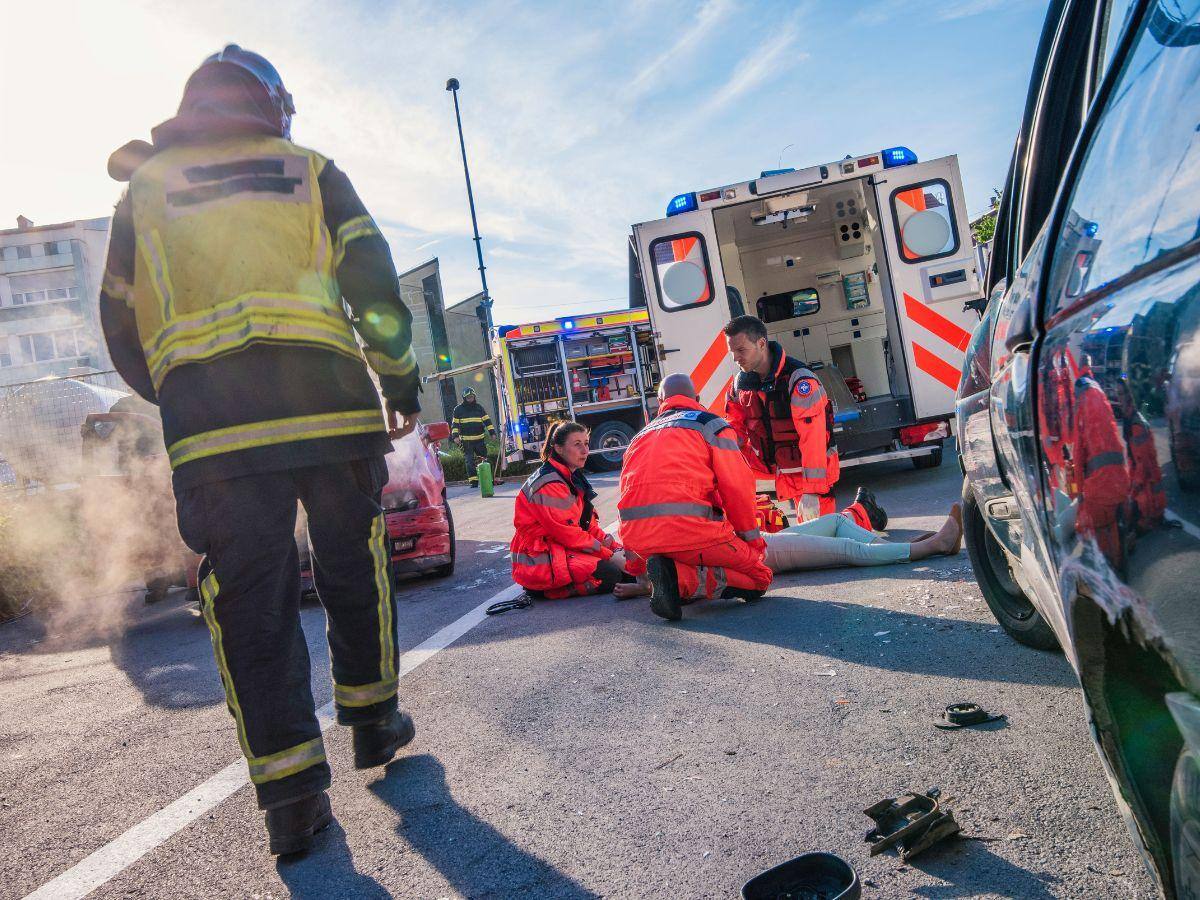Key Takeaways:
- After a car accident on vacation, staying calm, prioritizing safety, gathering crucial evidence, and contacting your insurance company and the rental car company if applicable is essential. Knowing these steps can make handling an out-of-town accident easier.
- Understanding your insurance policy, travel insurance, and rental coverage is key. Knowing what’s covered, including medical care and property damage, can protect you from unexpected expenses.
- Consulting with an experienced car accident attorney can provide valuable legal guidance and help you secure fair compensation. Car Wreck Doctor offers free consultations to support accident victims, even while traveling.
Whether you're on a relaxing getaway or business trip, dealing with the aftermath of a car accident isn't usually in your travel plans and can be overwhelming.
Being in an unfamiliar city on unfamiliar roads makes knowing what steps to take essential.
From contacting emergency services to gathering critical evidence, knowing the right moves can make a difference in your accident claim.
Car Wreck Doctor is here to guide accident victims through the complexities of an accident on vacation, providing expert advice on everything from insurance claims to medical care.
Below, we'll review a few crucial tips for managing an auto accident far from home.
Table Of Contents
- Prioritize Safety and Assess the Situation
- Contact Local Authorities and File an Official Report
- Gather Crucial Evidence at the Accident Scene
- Exchange Information with the Other Driver(s)
- Seek Immediate Medical Care and Keep All Medical Records
- Notify Your Insurance Company
- If Using a Rental Car, Inform the Rental Company
- Consider Consulting with an Accident Attorney for Legal Guidance
- Know Your Rights When Filing a Personal Injury Claim
Prioritize Safety and Assess the Situation
Safety should be your top priority in the immediate aftermath of a car accident.
Begin by assessing the accident scene and, if possible, move to a safe location away from incoming traffic.
Turn on your hazard lights to alert other drivers, reducing the risk of further incidents.
If you or any passengers have visible injuries or if anyone complains of pain, it’s crucial to contact emergency services right away.
Providing your exact location helps emergency responders reach you quickly, especially if you’re on an unfamiliar road or in a busy area.
Even if injuries seem minor, quick medical attention can address hidden injuries that might worsen over time.
By taking these initial safety measures, you’ll protect yourself and others and help secure the necessary information for your claim down the line.

Contact Local Authorities And File an Official Report
After ensuring everyone’s safety, the next critical step is to contact local law enforcement.
In an unfamiliar area, especially where different traffic signs or laws apply, involving police officers can provide clarity and ensure proper procedures are followed.
Filing an official police report is essential, as this document will serve as crucial evidence for your accident claim and help establish the version of events at the accident scene.
A police report often includes details on road conditions, possible traffic violations, and witness statements, making it an invaluable resource.
If language barriers are an issue, request assistance to ensure you fully understand the process and any required documentation.
Law enforcement involvement also supports a smooth claims process with your insurance provider.
It helps protect your rights, regardless of where the accident occurred.
Gather Crucial Evidence at the Accident Scene
Once you've filed an official report, gathering crucial evidence at the accident scene is vital.
Documenting the road conditions, accident-related injuries, and any vehicle damage provides critical evidence that may support your accident report and future insurance claims.
Use your phone to take clear photos and videos for visual evidence, capturing details like skid marks, vehicle positions, and any relevant road signs.
Keeping comprehensive records of all aspects of the scene can be invaluable, especially if your insurance provider or attorney needs detailed records of the incident.
Make note of any property damage to your vehicle and other involved vehicles, as well as any injuries, even if they appear minor.
This thorough documentation will help you create a strong case and ensure that all essential details are preserved for legal or insurance proceedings.
Exchange Information with the Other Driver(s)
Once you’ve documented the scene, exchanging contact information with the other driver(s) involved is essential.
Collect basic details, such as names, phone numbers, and addresses, and get their insurance details, including the insurance policy number and type of insurance they carry.
Avoid discussions about fault; this is especially important in cases where comparative negligence might play a role.
Let professionals determine who the at-fault motorist is rather than making statements that could be interpreted as accepting blame.
Ensure you gather all relevant details from other parties involved in the accident.
Taking these steps allows your insurance company to manage the claim more effectively.
It may protect you in future legal proceedings, providing a clear and thorough record of what occurred.
Seek Immediate Medical Care and Keep All Medical Records
After exchanging information, seeking immediate medical care is crucial, even if injuries appear minor.
A medical provider can identify any hidden injuries, such as internal bleeding, that might not be immediately visible but could worsen if left untreated.
Visit an emergency department if needed, and obtain a thorough medical report documenting any visible injuries.
All medical records, including medical bills and reports, are essential for future claims.
These comprehensive records serve as critical evidence if you need to pursue compensation or support a personal injury claim, ensuring your accident-related injuries are fully documented.
Notify Your Insurance Company
After ensuring you have thorough medical records:
- Notify your insurance company or insurance provider as soon as possible to start the insurance claims process.
- During communication with insurance companies, be ready to provide essential documentation for insurance claims, such as medical expenses, reports, and accident details.
- Confirm which types of coverage apply, including liability insurance, primary coverage, or secondary coverage. If you have travel insurance or rental car coverage, inquire about additional support they may offer.
Clear, organized documentation and timely updates to your insurance provider can help streamline the claims process, ensuring you get the maximum coverage available.
If Using a Rental Car, Inform the Rental Company
Once you've notified your insurance provider, it’s essential to inform the rental car company if you were driving a rental.
Contact the rental company immediately to report the accident and review your rental agreement for details on coverage.
Many rental vehicle agreements outline specific steps to follow, and failing to report the accident could impact your coverage.
Check if you have additional rental coverage through your credit card or have a collision damage waiver, as these may help cover repair costs within certain coverage limits. Understanding your coverage options through the rental company and any additional credit card benefits can prevent unexpected expenses and streamline the claims process.

Consider Consulting with an Accident Attorney for Legal Guidance
Consulting with an experienced car accident attorney for legal guidance may be beneficial, especially for complex cases.
An experienced car accident attorney can help you navigate legal process and determine the best course of action for securing compensation.
Car Wreck Doctor connects accident victims with a network of knowledgeable personal injury attorneys who offer free consultations, providing valuable legal representation.
Working with an accident lawyer establishes an attorney-client relationship that protects your rights and helps you understand what steps are needed for a successful claim.
Consulting a personal injury attorney can make the claims process smoother and give you peace of mind.
Know Your Rights When Filing a Personal Injury Claim
Understanding your rights when filing a personal injury claim is essential after an accident.
Navigating the insurance claims process can be challenging, especially after an out-of-town accident.
Understanding your options—from legal claims to potential accident settlements and financial compensation—can make all the difference.
Staying calm, documenting all details, and seeking expert advice are vital steps to a successful claim.
Car Wreck Doctor’s network of professionals offers free, no-risk consultations to help answer any questions and guide you through this process.
Whether you’re at home or traveling, Car Wreck Doctor is committed to providing reliable guidance and support for accident victims every step of the way.
Don’t leave your recovery and compensation to chance—reach out to Car Wreck Doctor today for the expert guidance and support you need to move forward with confidence.
People Also Ask
What happens if you get hurt on vacation?
If you get hurt on vacation, seek medical care immediately and document your injuries. It’s also essential to inform your insurance company and consult a personal injury attorney to understand your rights for any potential auto accident claims.
Does travel insurance cover car accident injuries?
Travel insurance may cover car accident injuries, depending on the auto insurance policy. Reviewing your travel insurance policy to confirm whether car accident injuries are included and what specific coverage options apply is important.
Is it OK to fly after a car accident?
Flying after a car accident can be risky, especially if you have serious injuries. It’s best to consult with your medical provider to determine if it’s OK to fly after a car accident.
Is travel anxiety after a car accident compensation?
Travel anxiety after a car accident may qualify for compensation if it impacts your daily life. Consulting with a personal injury attorney can help determine if travel anxiety after a car accident is eligible for compensation.


